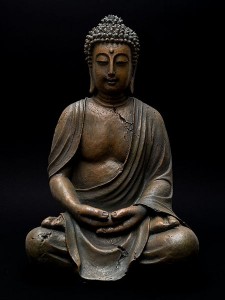SHOSHIN

Approaching Life with Beginner’s Mind
By Leo Babauta
A lot of our troubles could be solved by one simple practice.
A lot of joy could be found with the same practice.
And it is simple: practice seeing life with a beginner’s mind.
I’m stealing this of course from Zen Buddhism’s shoshin and Shunryu Suzuki’s Zen Mind Beginner’s Mind, and I’ve written about it numerous times. But it’s more fundamental than most people realize.
It’s not just something you practice when you’re learning something — though dropping the “expert’s mind” and seeing the learning as a beginner is an important practice in learning. It’s something you can practice every single moment of the day (if you can remember to do so).
What is beginner’s mind? It’s dropping our expectations and preconceived ideas about something, and seeing things with an open mind, fresh eyes, just like a beginner. If you’ve ever learned something new, you can remember what that’s like: you’re probably confused, because you don’t know how to do whatever you’re learning, but you’re also looking at everything as if it’s brand new, perhaps with curiosity and wonder. That’s beginner’s mind.
But imagine if you could apply this to every activity. Take eating breakfast, for example:
- You start by seeing the activity of eating with fresh eyes, as if you don’t know what to expect, as if you hadn’t done it thousands of times already.
- You really look at the food, the bowl, the spoon, and try to see the details that you might not normally notice.
- You truly notice the textures, tastes, smells, sights of the food, pay close attention as if you don’t already know how the food will taste. Everything seems new, perhaps even full of wonder.
- You don’t take anything for granted, and appreciate every bite as a gift. It’s temporary, fleeting, and precious.
As you can see, this practice of beginner’s mind transforms the activity.

Why It Matters
When you practice beginner’s mind with an activity:
- Better experiences: You aren’t clouded by prejudgments, preconceptions, fantasies about what it should be or assumptions about how you already know it will be. When you don’t have these, you can’t be disappointed or frustrated by the experience, because there’s no fantasy or preconception to compare it to.
- Better relationships: If you are talking to someone else, instead of being frustrated by them because they aren’t meeting your ideal, you can see them with fresh eyes and notice that they’re just trying to be happy, that they have good intentions (even if they’re not your intentions), and they are struggling just like you are. This transforms your relationship with the person.
- Less procrastination: If you’re procrastinating on a big work task, you could look at it with beginner’s mind and instead of worrying about how hard the task will be or how you might fail at it … you can be curious about what the task will be like. You can notice the details of doing the task, instead of trying to get away from them.
- Less anxiety: If you have an upcoming event or meeting that you’re anxious about … instead of worrying about what might happen, you can open yourself up to being curious about what will happen, let go of your preconceived ideas about the outcome and instead embrace not knowing, embrace being present and finding gratitude in the moment for what you’re doing and who you’re meeting.
As you can see, the practice of beginner’s mind can transform any activity, get rid of a lot of our difficulties, allow us to be more flexible, open, curious, grateful, present.
I’m not saying all of this happens auto-magically. It takes practice, but it’s worth the practice.

How to Practice
Beginner’s mind is what we practice in meditation. Instead of sitting in meditation and thinking you know what your breath will be like, or the present moment in front of you will be like … you pay attention. See it with fresh eyes. Drop your preconceived ideas and just look clearly at what’s in front of you.
A daily meditation practice is extremely useful in developing this beginner’s mind. Here’s how to practice:
- Sit comfortably and upright in a quiet place.
- Pay attention to your body, then your breath, trying to see them clearly and freshly.
- When you notice yourself having preconceived ideas, wandering from the present moment, thinking you know how it will be … just notice that.
- See if you can drop the ideas and thoughts and fantasies and stories that are filling up your head. Empty yourself so you can see what’s actually in front of you. See what your breath is actually like, right now, instead of what you think it will be or what you’re thinking about.
Repeat the last few steps, over and over. See the thoughts and fantasies, empty yourself and see what’s actually there with fresh eyes.
You can practice this right now, with whatever is in front of you. With how your body feels, how your breath feels, whatever else is around you.
You can practice whenever you do any activity, from brushing your teeth to washing the dishes to walking and driving and working out and using your phone.
You can practice whenever you talk to another human being, dropping your ideas of how they should be and instead emptying your mind and seeing them as they are. Notice their good heart, their difficulties, and be grateful for them as they are. Love them for who they are and find compassion for their struggles.
This is the practice. Do it with a smile, and with love, with fresh eyes and gratitude for the only universe we’ll ever get — the actual one in front of us.
https://zenhabits.net/beginner/


Replies